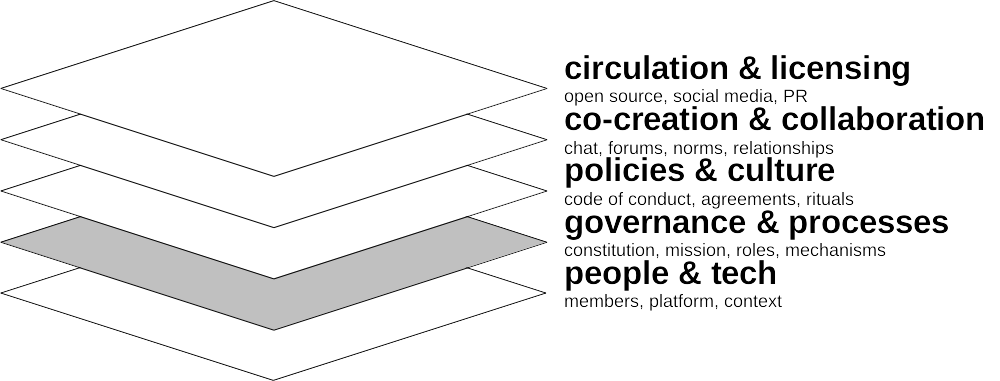Frequently Asked Questions
Can I help contribute to improving this project?
Absolutely, please do. The best way to start is to contribute bug reports and feature requests through the Issues system on GitLab (no programming required!). You can also submit code directly there if you’re into that.
Okay, my community has designed its Rule. What tools do we use to implement and enforce it?
CommunityRule can’t help with that. It depends a lot on what would be best for your group. If you’re looking for a platform to use, Loomio pairs very well with a simple Rule created here. CommunityRule is also part of a broader effort, the Metagovernance Project, which seeks to create a robust set of tools for online governance. In the meantime, good governance online tends to require some clever improvisation.
How does CommunityRule relate to codes of conduct or license agreements?
CommunityRule is focused on an often-missing component in online communities: the governance layer. Typically communities inherit the “implicit feudalism” of the underlying software, which usually centers around an all-powerful administrator. Codes of conduct (like the Contributor Covenant), license agreements (like Creative Commons), and other features of a community rest on that underlying governance logic. Here is one way of picturing a community “stack”:

The purpose of CommunityRule is to make it easier for communities to efficiently replace the default feudalism with a more appropriate and accountable governance system, or Rule. Communities can then use their preferred Rule to fill in other layers of the stack through an explicit process.
Why does focusing on the governance layer seem important? Haven’t online communities gotten along fine so far?
This project emerged out of a series of research projects. The first is called “Admins, Mods, and Benevolent Dictators for Life: The Implicit Feudalism of Online Communities,” and it traces the quiet persistence of surprisingly undemocratic tool-sets on platforms for online communities. This revealed that fostering democracy online tends to require extra work when compared to more feudal, non-democratic governance. Through the Metagovernance Project, this led to an ambitious proposal for software development, “Modular Politics.” CommunityRule is a more modest prototype, aiming to fill the gaps in online governance with a simple, natural-language toolkit in lieu of a more sophisticated software framework.
What’s with the name “Rule”? Aren’t these lists of multiple rules?
The use of “Rule” in the singular is in part a tribute to the idiom used for the governance documents of medieval Latin monastic communities, which go by the name Regula. These are some of the oldest governing documents still in active use, and they serve the dual purposes of governance and spiritual guidance.
“Community Rule” is also the name of document 1QS of the Dead Sea Scrolls, which served as a guiding text for a mysterious Jewish sect from about 100 BCE. 1QS provides a vital glimpse into ancient forms of creative community-making that would be otherwise lost to time.
What kinds of projects do you take inspiration from?
A bunch of stuff, and we have a running list in the project wiki.
What’s the current project roadmap?
A bunch of stuff, and we have a running list in the Issues on GitLab.
What projects does this draw upon?
- Created with Jekyll (MIT License) and Vue.js (MIT License), hosted on GitLab Pages
- Icons are from Tabler (MIT License)
- Database runs on Stein (MIT License), using this Google Doc
- Modules work on mobile thanks to dragdroptouch by Bernardo Castilho (MIT License)